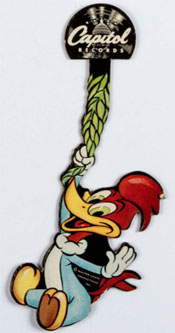 When Columbia Records released Kay Kyser’s version of “Woody Woodpecker” in May, 1948 (Columbia 38197) this did not go un-noticed by other companies. In response, their options were limited.
When Columbia Records released Kay Kyser’s version of “Woody Woodpecker” in May, 1948 (Columbia 38197) this did not go un-noticed by other companies. In response, their options were limited.
A strike had been going on since the beginning of the calendar year, keeping the various orchestras away from the recording studios. But a couple of firms did figure out ways around this dilemma.
The American Federation of Musicians refused to admit players of two instruments in particular–claiming that these were “not musical instruments”. They were the harmonica and the ukulele.
This was interesting–especially as, the year before (1947), a harmonica ensemble had a big hit with a revival of a 1913 chestnut, “Peg O’ My Heart”. Several companies rushed around trying to find a group to compete with the Harmonicats, a Chicago-based group who had the biggest-selling disc on this revival.
What’s more, both John Sebastian (senior) and Larry Adler were treading the concert stage, showing off what they could do with a humble mouth harp. Decca Records called two of their most popular acts into their Hollywood studio on June 4th, 1948, along with a group called “The Harmonica Gentlemen”. Some in the industry claim that these manipulators of the French harp were, in fact, the Harmonicats playing hookey on their contract with a small Chicago label–but that is not easy to discern.
For the Andrews Sisters and for Danny Kaye, this was a reunion. They had gotten together the year before to cut Decca’s cover of the song “Civilization (Bongo, Bongo, Bongo)“, which proved an artistic and commercial success.
Over at Capitol, they called on a group that had been kicking around on radio for a while–the Sportsmen Quartet. This group had done quite a few radio shows, and were regular features on “The Lucky Strike Program”, starring Jack Benny. They were used to singing without orchestral–or any other–accompaniment. They had done some a capella selections for MacGregor transcriptions during the first strike, around 1943.
For the recording, the Sportsmen had the accompaniment of a ukulele, a vocal bass–and the able assistance of Mel Blanc. Mel had originated the Woody Woodpecker laugh back when the character was brand-new. He had been in on the ground floor (in Knock Knock (1940)), and had done Woody’s voice until he had signed the deal that gave him screen credit on Warner Bros. cartoons.
The Capitol recording also displayed some of the recording techniques that were just coming on line.
Film soundtracks had been featuring sped-up voices–and the effect that speeding them up has–for a few years. But, until the advent of magnetic tape, such effects were difficult to achieve on records. Not only is Mel sped up in his “Woody” laugh–but the Sportsmen are also sped up,too — in the second chorus of the song.
Both the Kaye-Andrews Decca and the Sportsmen-Blanc record for Capitol made Billboard’s charts–although I do not yet know which of their charts these discs made. But neither version could hold the proverbial candle to the sales of the Kay Kyser record on Columbia.
By the way, there was one other version that came out for the grown=up trade. But the Mercury disc by the Honeydreamers (a busy New York-based male/female group) did not stir up any particular reaction in the marketplace.


 James Parten has overcome a congenital visual disability to be acknowledged as an expert on the early history of recorded sound. He has a Broadcasting Certificate (Radio Option) from Los Angeles Valley College, class of 1999. He has also been a fan of animated cartoons since childhood.
James Parten has overcome a congenital visual disability to be acknowledged as an expert on the early history of recorded sound. He has a Broadcasting Certificate (Radio Option) from Los Angeles Valley College, class of 1999. He has also been a fan of animated cartoons since childhood.












































As a ukulele player myself, I have to wonder – if it’s not a musical instrument, what is it?
Perhaps Petrillo or some other AFM official felt that ukuleles and harmonicas were of amateur caliber, like kazoos, ocarinas and jaw-harps.
According to Joel Whitburn’s Pop Memories 1890-1954, the (generally) authoritative reference on this subject, both the Kaye-Andrews and Sportsmen-Blanc peaked on the charts 70 years ago this week; Kaye’s at #18 and the Sportsmen at #2, where it remained for five weeks.
I don’t know how the Mel Blanc / Sportsmen disc was recorded – likely dubbing the sped-up parts from another disc played back at double speed, which frankly sounds too fast for a Woody voice, coming off Chipmunk-style. (Ross Bagdasarian did his recordings on tape, and tape machines typically came with built-in speed changes of double, or half, the next setting.)
If you want to hear the Blanc recording slowed down to half-speed, where the voices sound normal, take a listen:
https://clyp.it/u0nsrxy2
When Mel was doing Woody (or Daffy, or any of his other speed-altered characters) for the cartoons, there was less of a speed change. I’m guessing this is because the optical sound recorders used at the time had speed settings in feet-per-minute, the standard measurement for film. The old 60 FPM rate (silent speed, 16 frames per second) could be used to record a voice that could then be played at sound speed, 90 FPM (24 fps) and you’d get a speed/pitch increase to 150% – less than “chipmunk” speed. That seems to be how the Woody voice was originally done, by Mel and later Ben Hardaway.
Here’s a clip of Hardaway (in “Wet Blanket Policy”), slowed to 2/3 speed:
https://clyp.it/qhncckfa?token=2c5500f310b92bc7e10ccacec49e4691